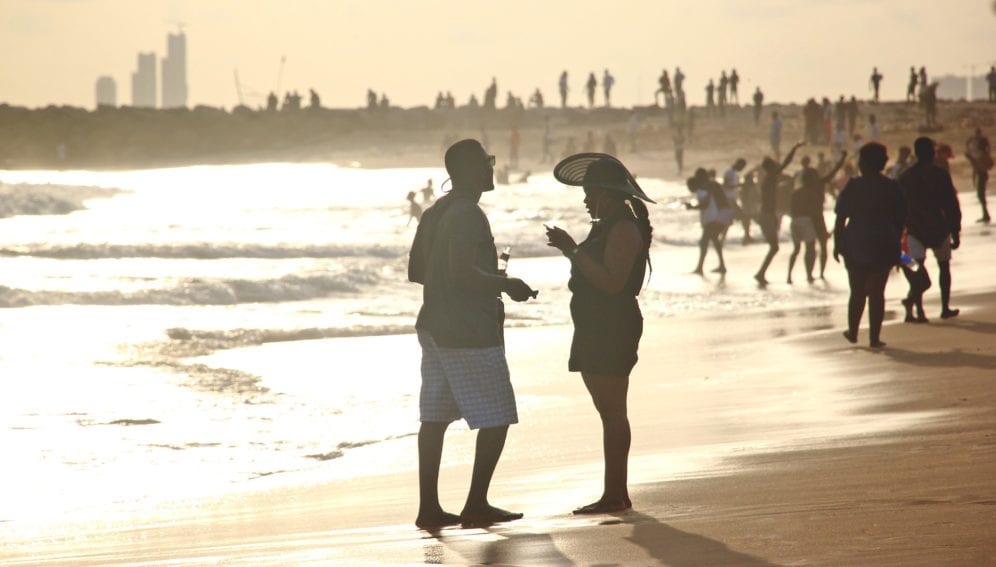18/12/20
Holiday season could spike Africa’s COVID-19 cases

By: Laura Owings
Send to a friend
The details you provide on this page will not be used to send unsolicited email, and will not be sold to a 3rd party. See privacy policy.
[CAPE TOWN] As the Christmas and New Year holiday season, and a sense of complacency around safety measures creep in, scientists warn there could be a surge in COVID-19 cases across Africa.
According to the World Health Organization, Africa recorded 74, 489 cases of COVID-19 in seven days before 13 December, representing a 40 per cent change in new cases compared with the previous week. The weekly percent change is the highest in the world, with the next regions being Western Pacific (13 per cent) and the Americas (11 per cent).
“We are concerned about a spread of COVID-19 during the holiday season, especially for the continent as a whole,” says Wessam Mankoula, emergency operations centre lead for the Africa Centres for Disease Control and Prevention, in an interview with SciDev.Net last week. “However, that will depend on people’s behaviour during this time and whether they keep to protective measures.”
He suggests that people need to take care to learn about COVID-19 in their community before deciding to travel or to meet other people during the holiday season. “Be aware if there are sporadic cases in the community, or if there is a huge number of cases which would make gathering there a high risk,” he adds.
“We are concerned about a spread of COVID-19 during the holiday season, especially for the continent as a whole.”
Wessam Mankoula, Africa Centres for Disease Control and Prevention
African governments acted swiftly in the early days of the pandemic and imposed restrictions such banning social gatherings and travels to contain the spread of COVID-19. But these have been eased with some countries, such as Kenya, Rwanda, and Senegal resuming international flights in August.
South Africa is currently measuring the highest number of COVID-19 cases on the continent, according to the Africa Centres for Disease Control and Prevention. However, experts are worried about a widespread second surge resulting from travel and celebrations over the holiday period.
Those taking trains and public transport should also be vigilant. “When we have gatherings, we have people attending using public transport. That close contact with strangers increases risk of transmission,” Mankoula explains.
Road transport is the most common form of movement into and out of African countries. In South Africa, for instance, more than 3.9 million people passed through the country in January 2020, with 70 per cent using road transport, according to Stats SA.
But travel may not pose as great a risk as public gatherings, according to Shabir Madhi, a professor of vaccinology at the University of the Witwatersrand in Johannesburg, South Africa.
“People do tend to let their guard down when travelling, but there is compelling evidence indicating the driver of resurgence is how people engage in gatherings,” he says, citing indoor dining, pubs, clubs and places of worship as high risk.
“Over the holiday period we need to be sensitive to avoiding indoor gatherings, especially in poorly ventilated areas, and adhere to wearing face masks and social distancing,” he says, adding that a sense of complacency has crept in around these measures in Africa.
Ngozi Oguguah, a principal research officer at the Nigerian Institute for Oceanography and Marine Research in Lagos, had planned to travel to her hometown Awka in Nigeria but decided against the trip.
“I always have concerns about COVID,” she tells SciDev.Net. “I tell my kids to wear a mask, and observe all the protocols, but most people don’t.”
She says that people have more pressing needs than worrying about the virus. “People are focused on making money to feed themselves. Inflation is very high, and the cost of food has gone up,” she adds.
Indeed, livelihoods were put on the line with lockdown measures, according to Madhi: “African countries were never in a position to go into high levels of lockdown and restrict economic activity.”
But Madhi adds that tougher restrictions may be needed. “We want to avoid at all costs overwhelming healthcare facilities, which could lead to excess death that could be prevented,” he says.
For Mankoula, the best thing is for everyone to stay at home over the holiday period.
“With the vaccine slated for early 2021, we’re in the last mile of fighting this pandemic,” he says.
“We must stay safe and keep protective measures in place, so we don’t lose our loved ones when we’re so close.”
Favourite Maworera, a 45-year-mother, is deciding whether to travel from South Africa to Zimbabwe to be with her son and mother for the festive season.
“I want to go home, but with the virus I’m unsure. Maybe the government will decide to lock down the border and I won’t be able to come back,” she tells SciDev.Net.
Although she has not seen her family in over a year, being unable to return to South Africa could mean a significant financial impact on everyone. “I have to be able to come back and work so I can send money and goods home,” she says.
There is also the threat of the virus itself. The trip takes three days by bus, which is usually packed to capacity. With COVID-19 controls expected at the border, Maworera might spend even longer in the cramped space. “Do you think everyone is going to wear a mask?” she asks.
This piece was produced by SciDev.Net’s Sub-Saharan Africa English desk.













